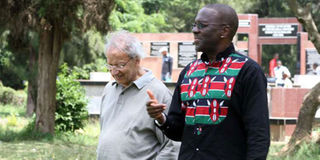Jubilee suffers big blow from icons of democracy

Kenya's Chief Justice Willy Mutunga (right) conversing with Constitutional Law expert Yash Pal Gai at Freedom Corner in Uhuru Park, Nairobi, on January 9, 2016. The State, the CJ has said, is helplessly stuck in criminality. PHOTO | ROBERT NGUGI | NATION MEDIA GROUP
What you need to know:
- Dr Mutunga and Mr Odinga are icons of the struggle for democracy and civil liberties; both were detained for their beliefs and activism and their politics is to the left of the spectrum.
- In a well thought-out, argued and hard-hitting interview with a Dutch publication, Dr Mutunga caustically branded Kenya a polity run by mafia-style cartels, criminal gangs and corrupt politicians and business people.
- It is now clear why MPs would want to hastily change the law to allow the President a free hand in the appointment of the next Chief Justice.
The government took great flak from one of its own, namely, Chief Justice Willy Mutunga, and the country’s most formidable Opposition politician, Mr Raila Odinga.
Much to its dismay, the common denominator to the attacks by the two is grand corruption, which is its Achille’s heel.
With President Kenyatta busy at the opposition-dominated Coast, Deputy William Ruto in the dock at the International Criminal Court at The Hague and with him the most hawkish and hardline politicos, the timing of Dr Mutunga’s interview and Mr Raila’s news conference stumped the government.
Previously, supporters of the governing Jubilee coalition would have easily argued that the attacks were choreographed, coming, as they did, within days of each other, the very strong language employed by the protagonists and the fact that both picked on graft and struck when the government least expected it.
Dr Mutunga and Mr Odinga are icons of the struggle for democracy and civil liberties; both were detained for their beliefs and activism and their politics is to the left of the spectrum.
But Mr Odinga has since 2013 held that Dr Mutunga, and the Supreme Court he leads, unfairly handed the presidency to Mr Kenyatta.
In a well thought-out, argued and hard-hitting interview with a Dutch publication, Dr Mutunga caustically branded Kenya a polity run by mafia-style cartels, criminal gangs and corrupt politicians and business people.
He called Kenya’s a bandit economy and accused the State of engaging in illicit business, including charcoal smuggling in Somalia.
It cannot get worse from a highly placed insider, who is a respected jurist, speaking to a foreign journal and audience.
But the CJ put his boot in: “You are taking these people into a corrupt investigating system, through a corrupt anti-corruption system, and through a corrupt Judiciary.”
No, he did not spare his own docket, but in one fell swoop he demolished any claims Nairobi may have to credibility of governance, fighting corruption or freeing itself from the stranglehold of money-laden and power-wielding cartels and criminal gangs.
NEW LEADERSHIP
The State, the CJ was saying, is helplessly stuck in criminality.
The CJ did not have confidence that his Judiciary and the other arms of government could take Nairobi out of this morass, which is why he suggested only a new breed of leaders, committed to a new dispensation, would save Kenya.
That hurt, for Jubilee only came in, in 2013, celebrating youthful leadership and switch to a new digital era.
The CJ has access to information that ordinary Kenyans do not.
As head of the Judiciary he has clout that many in the government and political elite envy and so his word carries considerable freight.
As he prepares to exit mid this year, he has clearly made it known his four-year anti-graft crusade in the Judiciary is up against criminal cartels.
It is now clear why MPs would want to hastily change the law to allow the President a free hand in the appointment of the next Chief Justice.
What the MPs cannot do, by legislative fiat, is end a welter of suspicions over the use of $2 billion Eurobond or shut up Mr Odinga who persistently alleges theft of incredible billions from the loan.
At his news conference, Mr Odinga was armed not just with his seven-page statement of opening remarks, but also a 22-page document that detailed the labyrinth that is the acquisition, transfers between overseas and local banks, and memos between Treasury, Controller of Budget and the Auditor General.
CRUCIAL DETAILS
While most attention focused on Mr Odinga’s remarks, especially the list of top government officials he labelled “persons of interest”, the interest should be on the 22-page document.
The opener and “persons of interest” are but a preamble to this document in whose details, Mr Odinga says, lies and hides the devil.
A casual dismissal of the document will not do.
It details that laws of the land about handling public money have been flouted by the National Treasury; it traces the movement of the money; it alleges crucial information has been redacted on certain documents in an elaborate scheme of deception and theft of public resources.
The document requires a blow-for-blow rebuttal by the government.
First, because the list of “persons of interest” suggests that the masterminds of the alleged theft are at the heart of government.
Second, the government needs to match the money to visible infrastructure projects to which it was allocated and spent.
Baba did his homework. It’s the government’s onus to mark its work.
Kwendo Opanga is a journalist and media consultant. [email protected]





